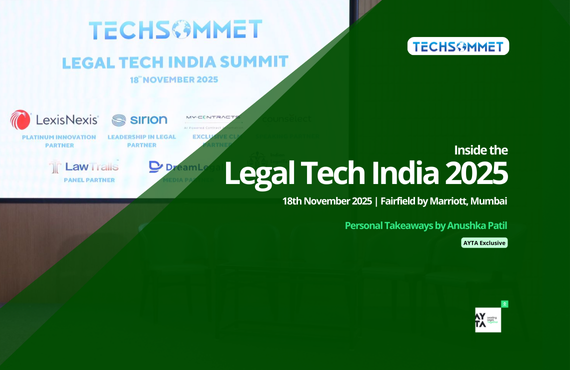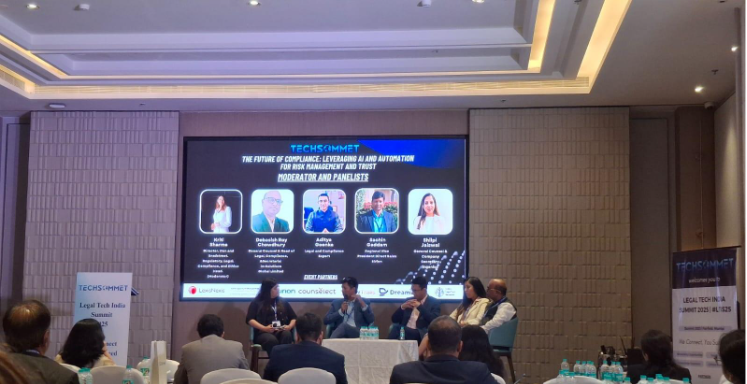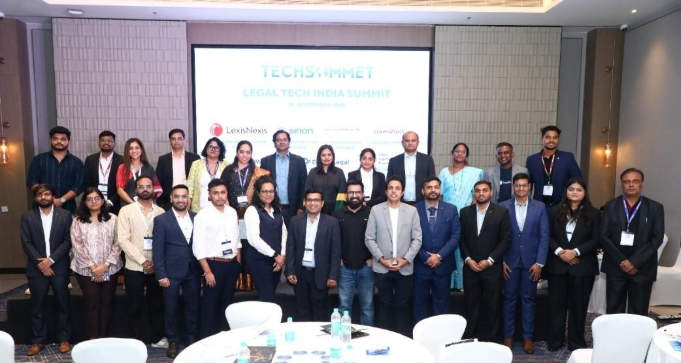AYTA Exclusive
This is a personal takeaway from the LegalTech India Summit 2025, capturing the eager and energetic atmosphere of the budding Indian LegalTech scene. It reflects on sessions that honestly assessed Generative AI as a powerful expediting tool, while reinforcing that human judgment and accountability are non-negotiable in legal work.
Author :
Anushka Patil
Published :
November 21, 2025


Walking into the LegalTech India Summit 2025 felt both exciting and slightly overwhelming. I am still quite new to this space, and this was one of the first events where I was surrounded by so many people who have been shaping the legal and technology landscape for years. But within minutes of entering the venue, whatever hesitation I had disappeared. The atmosphere felt warm, curious and surprisingly welcoming.
Indian LegalTech space is at a budding phase; people are curious and energetic! What truly stood out from the very beginning was the energy at the event. People were not just walking around with polite smiles; they were actively engaging. Everywhere I looked, someone was explaining a workflow challenge, showing a product demo, asking about AI adoption or sharing how their team approaches compliance risks. There was a sense of eagerness in the room. People wanted to learn. They wanted to connect. They wanted to understand how the next phase of legal tech will unfold in India. It felt like an ecosystem in motion.

There were __ sessions at the event that carried the same level of honesty and clarity. Instead of simply discussing technology as a shiny solution, the discussions focused on what happens within legal teams.
One panel explored how generative AI is changing legal research, drafting and review. The speakers discussed both its strengths and limitations, noting that AI can support and expedite legal work, but the ultimate decision will always be a human responsibility. Judgment, validation, and accountability cannot be automated, and that crucial perspective kept recurring throughout the day.
Another panel on compliance spoke about the growing pressure on organisations to manage data, risk and reporting in a more structured way. Listening to in-house leaders describe the realities behind these systems made the entire topic feel far more human and relatable.
There was also a thoughtful conversation around contract lifecycle management (CLM). The discussion moved beyond the usual talking points and focused on the shift from simple automation to intelligent contract systems that can help teams make better decisions.
This led to a key undercurrent discussion that defined the summit: the human challenge of adoption and change management. As one leader wisely put it, "Culture eats technology for breakfast." I realized very quickly that legaltech is not difficult because the technology is complex. It is difficult because the legal ecosystem has its own pace, its own habits, and its own way of working.
The most difficult part of implementation isn't the software itself but overcoming the skepticism and resistance from professionals comfortable with established, manual workflows. This mindset was summed up by one founder: "In law, they look down upon failure. In business, failure is an opportunity." It was a refreshingly honest reminder that if legal teams' systems never fail, they're likely not innovating or adapting fast enough
Integrating technology is not just about buying a tool; it is about changing processes, aligning people, and making sure the solution truly blends into daily workflows. And for the founders present, a crucial reminder was shared: "Focus on capability, capital will follow." It encapsulates the priority the entire ecosystem needs right now.

One of my favourite moments of the day was the panel featuring women building legaltech. Their stories were real in a way that stayed with me. They spoke about unexpected choices, moments of uncertainty, challenges that came out of nowhere and the determination it takes to keep going. As someone just entering this space, it felt grounding to hear that even the most experienced people had their own learning curves. It reminded me that there is no perfect way to grow in this field. You learn by staying curious, by asking questions and by paying attention to real problems.
The organisers deserve a lot of credit for creating a space that felt structured yet easy to be part of. The day flowed smoothly. The topics felt connected. The audience stayed engaged until the very end. There was a good balance between technical insights and broader industry conversations, which made it approachable even for someone like me who is still learning.

By the end of the summit, I walked out with a sense of clarity that I did not expect to gain in just one day. I understood the industry a little better. I understood the challenges more clearly. What’s next for the industry? It’s clear that Legaltech in India is growing, not through hype, but through thoughtful discussions and steady, responsible effort; a transition shaped primarily by how teams adapt and collaborate.
I left feeling inspired in a very grounded way. Not the kind of inspiration that fades quickly, but the quiet kind that motivates you to keep exploring and contributing in your own way. Representing AYTA at this event made me realise how important it is to stay close to the real conversations happening in the industry. I am excited to see where it leads next.
Looking forward for more such events in #LeadingLegalTogether
Best regard,
Anushka Patil
Thanks & regards
AYTA LegalTechConsultingGet in touch at
reach@ayta-legaltech.comStay ahead and subscribe for expert legal tech updates, worldwide.